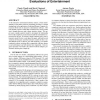119 search results - page 6 / 24 » Understanding and evaluating cooperative games |
ICML
2010
IEEE
13 years 8 months ago
2010
IEEE
This paper experimentally evaluates multiagent learning algorithms playing repeated matrix games to maximize their cumulative return. Previous works assessed that Qlearning surpas...
ATAL
2008
Springer
13 years 9 months ago
2008
Springer
In this paper, we study the role of emotions and expressive behaviour in socially interactive characters employed in educational games. More specifically, on how we can use such e...
HRI
2011
ACM
12 years 11 months ago
2011
ACM
In this paper, we present a real world user study of 4 interfaces designed to teach new visual objects to a social robot. This study was designed as a robotic game in order to mai...
FDG
2009
ACM
14 years 2 months ago
2009
ACM
As the interactive entertainment industry matures, a better understanding of what makes software entertaining is needed. A natural starting point is the application of traditional...
EOR
2008
13 years 7 months ago
2008
The Cooperative Water Allocation Model (CWAM) is designed within a general mathematical programming framework for modeling equitable and efficient water allocation among competing...


